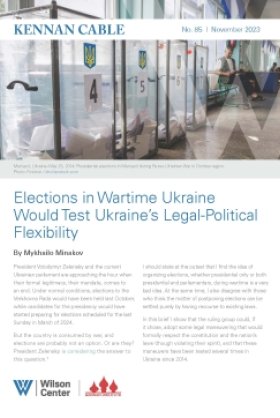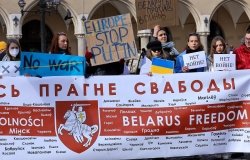Democratic Consolidation in Serbia: Pitfalls of the Post-Djindjic Transition
Lenard Cohen, Professor of Political Science, Research Institute on Southeastern Europe, Simon Fraser University
Overview
Democratic Consolidation in Serbia: Pitfalls of the Post-Djindjic Transition
March 10, 2004
Staff-prepared summary of the EES noon discussion with Lenard Cohen, Professor of Political Science, Research Institute on Southeastern Europe, Simon Fraser University
Lenard Cohen, a preeminent expert on the Balkans, suggested some positive trends towards democratic consolidation in Serbia, despite what is easily construed as chaos in the country's political structure since the removal of President Slobodan Milosevic in October of 2000. In his assessment of the situation overall, Cohen quoted Miroljub Labus, saying that Serbia's main problems stem from the fact that the removal of Milosevic was a "counter-revolution without a revolution." By this he meant that Milosevic's ouster did not remove the government structure he created. The fact that Serbia has been unable to dissociate itself from its past has been responsible for Serbia's slow pace in tackling the more visible problems of weak institutions, sluggish economic growth and the country's nationalist obsession.
Creating a will for reform has been difficult in the post-Djindjic political climate. The growing feud between the political parties of Zoran Djindjic and Vojislav Kostunica got in the way of a concerted effort by the government to shake off the pervasive influence of organized crime groups. As a result, the central police and intelligence organization, the BIA, have never been adequately reformed. Even after Djindjic's assassination, the government has failed to take steps towards reforming the police and judiciary. "Operation Sword," which was initiated to bring Djindjic's assassins to justice, ended in apathy and cynicism since it failed to identify, let alone capture, the plot's ringleader.
Despite this political backsliding, certain trends in the political development in Serbia offer reasons for optimism. Although the success of radical nationalists in the December 28 parliamentary elections was cause for alarm, the overall results revealed a reformist orientation. This important civil society trend should not be overlooked despite the fact that these democratic parties have been unable to unite and moderate.
Another positive development is the trend towards party consolidation. With only six parties represented in Parliament, Serbia has overcome the excessive fragmentation of its party system of the preceding Parliament. Party consolidation will be helped in the next elections, when a new electoral law will go into effect, which will create more transparency in campaign financing and allow parties to operate in a more professional way.
The largest obstacle to reform is the radicalization of Serbia's political climate. Serbia has been slow to use the lure of EU enlargement as a moderating force in politics, and slow reforms have caused high unemployment, low privatization, a mounting foreign debt, all of which feed the flames of radicalization. This is due in part to the country's inability to let go of the past, which is reinforced by nationalist politicians who manipulate the issue of Kosovo. With the Serbs insisting that a solution be found to link Kosovo to Serbia, and the Albanians completely rejecting this stance in favor of independence, coming to a final agreement on Kosovo will be extremely difficult. This anxiety over Kosovo, coupled with continuing problems in the "union" between Serbia and Montenegro, and calls for more autonomy in the province of Voivodina, are fueling anxieties within Serbia about its territorial cohesion. This anxiety, in turn, continues to play into feelings of nationalist xenophobia.
Hosted By

Global Europe Program
The Global Europe Program is focused on Europe’s capabilities, and how it engages on critical global issues. We investigate European approaches to critical global issues. We examine Europe’s relations with Russia and Eurasia, China and the Indo-Pacific, the Middle East and Africa. Our initiatives include “Ukraine in Europe” – an examination of what it will take to make Ukraine’s European future a reality. But we also examine the role of NATO, the European Union and the OSCE, Europe’s energy security, transatlantic trade disputes, and challenges to democracy. The Global Europe Program’s staff, scholars-in-residence, and Global Fellows participate in seminars, policy study groups, and international conferences to provide analytical recommendations to policy makers and the media. Read more
Thank you for your interest in this event. Please send any feedback or questions to our Events staff.









